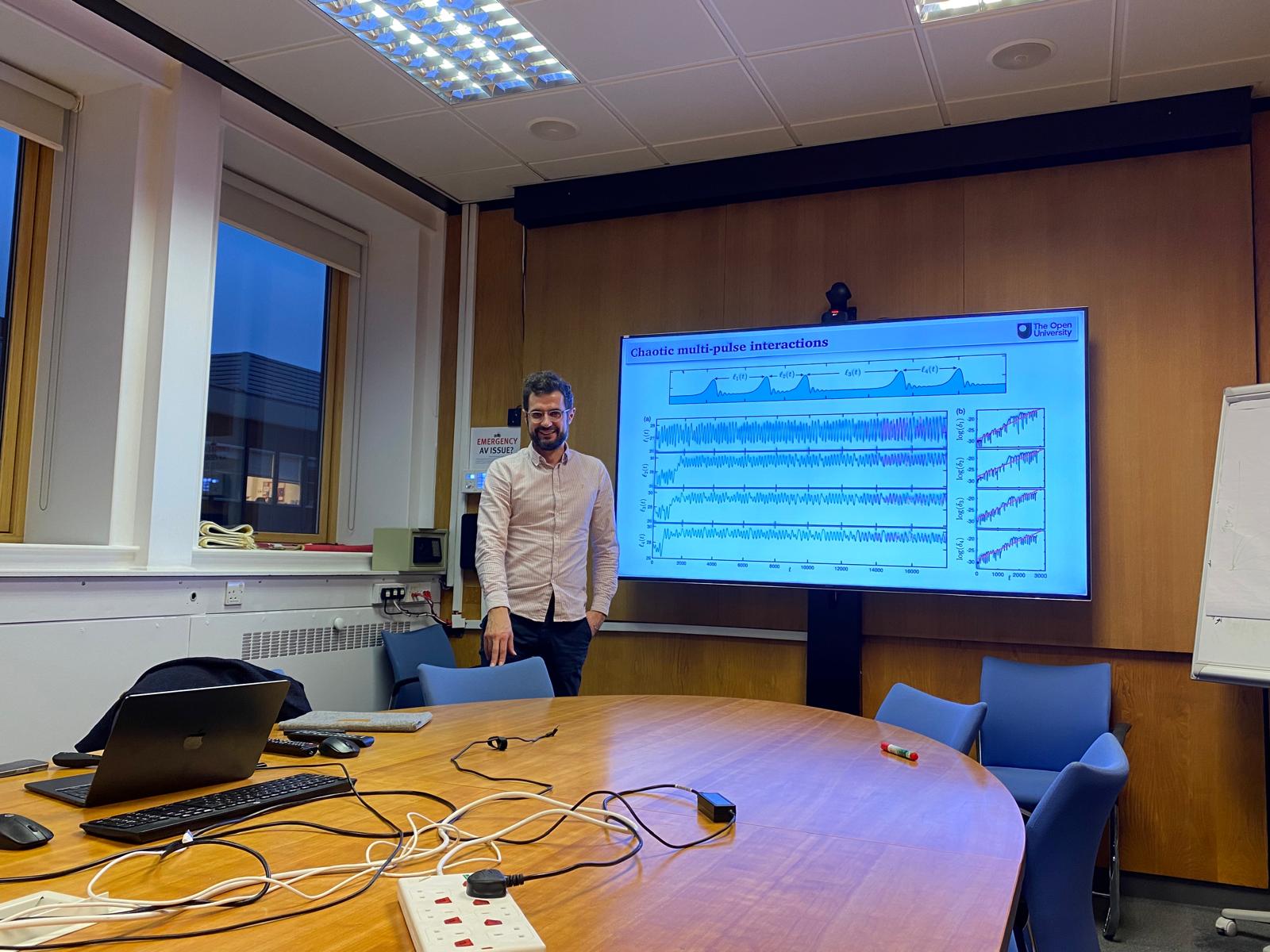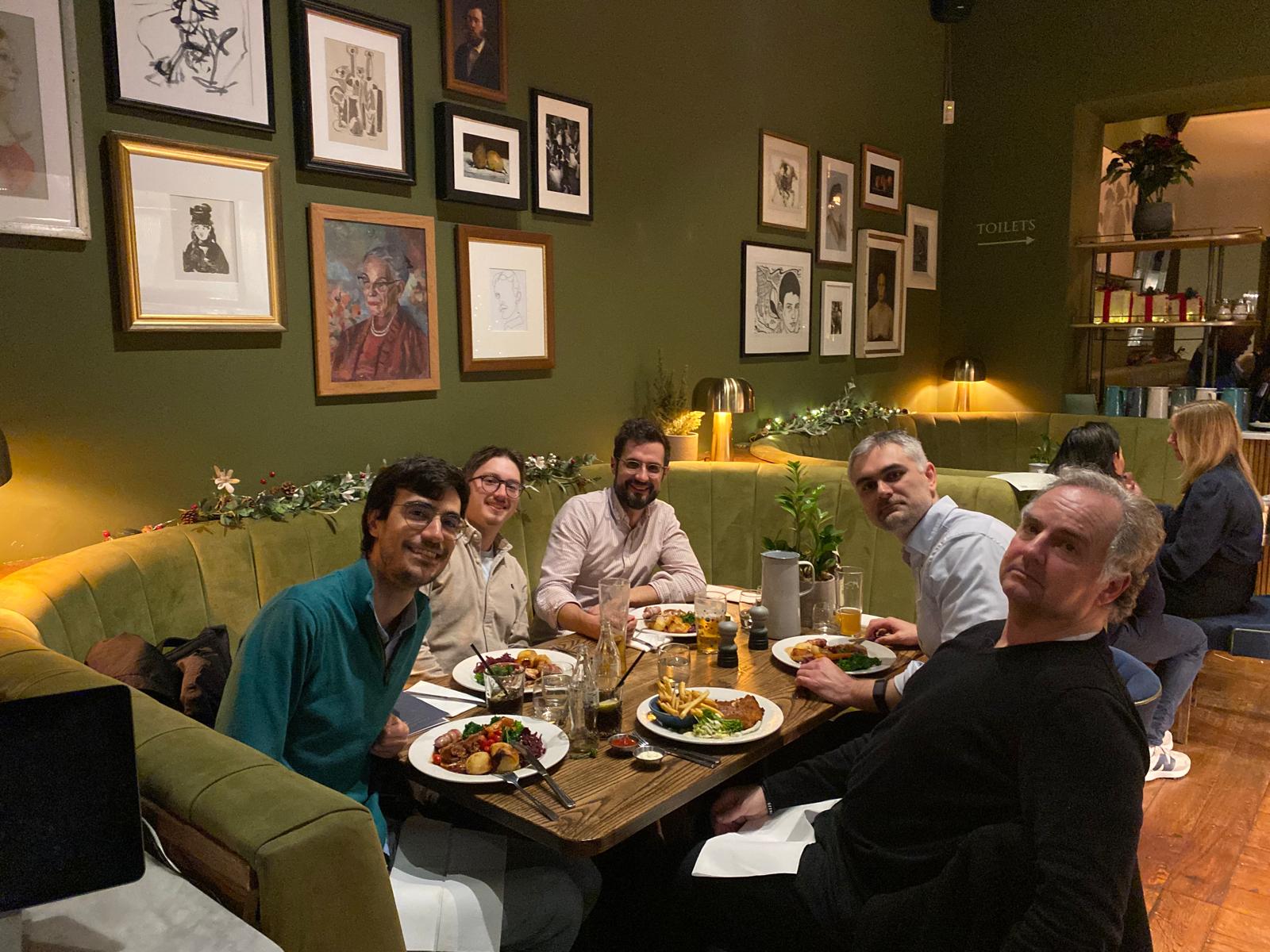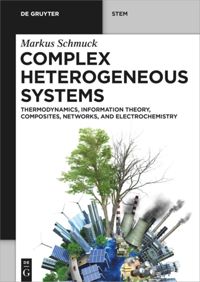[13/12/24] A visit from an old friend. Our friend and collaborator, Dr. Marc Pradas (Open University) visited our group to gave us a talk entitled "Coherent structure interactions driven by excited hidden modes". Following his talk, we enjoyed a Christmas social.


[09/12/24] Hydrodynamic density-functional theory for the moving contact-line problem reveals fluid structure and emergence of a spatially distinct pattern. Understanding the nanoscale effects controlling the dynamics of a contact line—defined as the line formed at the junction of two fluid phases and a solid—has been a longstanding problem in fluid mechanics pushing experimental and numerical methods to their limits. A major challenge is the multiscale nature of the problem, whereby nanoscale phenomena manifest themselves at the macroscale. To probe the nanoscale, not easily accessible to other methods, we propose a reductionist model that employs elements from statistical mechanics, namely, dynamic-density-functional theory (DDFT), in a Navier-Stokes-like equation—an approach we name hydrodynamic DDFT. The model is applied to an isothermal Lennard-Jones fluid with no slip on a flat solid substrate. Our computations reveal fluid stratification with an oscillatory density structure close to the wall and the emergence of two distinct regions as the temperature increases: a region of compression on the vapor side of the liquid-vapor interface and an effective slip region of large shear on the liquid side. The compressive region spreads along the fluid interface at a lengthscale that increases faster than the width of the fluid interface with temperature, while the width of the slip region is bound by the oscillatory fluid density structure and is constrained to a few particle diameters from the wall. Both compressive and shear effects may offset contact line friction, while compression in particular has a disproportionately high effect on the speed of advancing contact lines at low temperatures.
Our study has been published in the Physical Review Fluids journal.
[03/12/24] Dr. Toby Kay led the Chemical Engineering team to victory in a football tournament organised by Imperial College London. We celebrate the amazing performance displayed by Toby. Well done!

[04/09/24] Mr. Antonio Malpica-Morales gave a contributed talk at the Metastability and Tipping in Complex Systems conference, Leicester, UK, 2024. The talk was entitled "Data-driven approach for modelling complex systems using a multivariate non-parametric Langevin equation".
[09/08/24]

From a recent get together of the group and guests. From left to right: Toby, Peter, Serafim, Sissy, Frank, Tushar, Antonio.
[03/06/24] We are excited to announce that Dr. Toby Kay has joined us from the University of Bristol to work as Postdoctoral Research Associate in Statistical Mechanics of Nonequilibrium Processes. The position is part of the ERC Advanced Grand/UKRI Frontier Research “Machine-Aided General Framework for Fluctuating Dynamic Density Functional Theory (MAGFFDDFT)”.
Toby's research background and expertise are in the areas of non-equilibrium statistical physics, stochastic processes and complex systems.
Toby, welcome to Imperial and to our group.
 [22/04/24] Dr. Markus Schmuck has published a book entitled: "Complex Heterogeneous Systems: Thermodynamics, Information Theory, Composites, Networks, and Electrochemistry".
[22/04/24] Dr. Markus Schmuck has published a book entitled: "Complex Heterogeneous Systems: Thermodynamics, Information Theory, Composites, Networks, and Electrochemistry".
Markus' research on energy storage systems generally was confronted with five characteristics, i.e., complex, interacting, transporting, reacting, and heterogeneous systems. Hence, we refer to these kind of systems as Complex Heterogeneous Systems (CHeSs).
The book considers interacting systems that exchange energy, mass, information, etc. in various ways. The elementary building blocks of CHeSs are based on fundamental thermodynamic, chemical, material, physical, and mathematical principles such as variational and graph-theoretic concepts. It investigates ways of defining complexity, computing percolation thresholds, making smart decisions also by learning from data/past experiences (e.g., providing a systematic approach towards battery management systems), and identifying battery life (e.g., by blow-up analysis of highly nonlinear concentrated solutions).
The book is a culmination of many years of rigorous work that Markus has done on PDEs, homogenisation theory and heterogeneous media.
[10/04/24] Mr. Antonio Malpica-Morales gave a contributed talk at the British Applied Mathematics Colloquium (BAMC), Newcastle, UK, 2024. The talk was entitled "Physics-informed Bayesian inference of external potentials in classical density-functional theory".
[01/04/24] Forecasting with an N-dimensional Langevin equation and a neural-ordinary differential equation. We develop a data-driven model that combines an N-dimensional Langevin equation (LE) with a neural-ordinary differential equation (NODE). The LE captures fine-grained details of the electricity-price behavior in stationary regimes but is inadequate for non-stationary conditions. To overcome this inherent limitation, we adopt a NODE approach to learn, and at the same time predict, the difference between the actual electricity-price time series and the simulated price trajectories generated by the LE. By learning this difference, the NODE reconstructs the non-stationary components of the time series that the LE is not able to capture. We exemplify the effectiveness of our framework using the Spanish electricity day-ahead market as a prototypical case study. Our findings reveal that the NODE nicely complements the LE, providing a comprehensive strategy to tackle both stationary and non-stationary electricity-price behavior.
Our study has been published in the Chaos journal, focus issue on Data-Driven Models and Analysis of Complex Systems.
[20/03/24] We are excited to announce that Dr. Dimitrios Gourzoulidis has joined us from École Polytechnique Fédérale de Lausanne in Switzerland to work as Postdoctoral Research Associate in Machine Learning of Nonequilibrium Processes. The position is part of the ERC Advanced Grand/UKRI Frontier Research “Machine-Aided General Framework for Fluctuating Dynamic Density Functional Theory (MAGFFDDFT)”.
Dimitrios' research background and expertise are in the areas of applied and computational mathematics, numerical analysis and scientific computing.
Dimitrios, welcome to Imperial and to our group.
[08/03/24] Dr. Peter Yatsyshin and Mr. Antonio Malpica-Morales, gave contributed talks at the APS March Meeting, Minneapolis, Minnesota, March 3-8, 2024. Their talks were entitled,
"Data-driven solution of the inverse problem in classical statistical mechanics"
and
"A data-driven framework for non-stationary complex systems: Blending generalized Langevin and neural ordinary differential equations",
respectively.
[21/02/24] Prof. Serafim Kalliadasis gave an invited talk entitled "Classical density-functional theory: from formulation to nanofluidics to machine learning" at the newly established annual Solid Mechanics and Mathematics Seminar Series, University of Oxford. This was the 2024--inaugural talk of the Seminar Series.
[16/02/24] A falling fluid droplet in an oscillating flow field. We examine the flow in and around a falling fluid droplet in a vertically oscillating flow. We assume axisymmetric Stokes flow, and for small deformations to the droplet, the governing equations can be linearized leading to an infinite system of linear ordinary differential equations. In this study, we have analytically solved the problem in the small-capillary limit. We note that the solution locally breaks down at the poles of the droplet. The drag and center of the mass were also obtained. In the case when only odd modes are present, the droplet shows three-dimensional axisymmetric heart-shaped solutions oscillating vertically in time. When only even modes are present, the droplet exhibits axisymmetric stretching and squeezing.
Our study has been published in the Physics of Fluids journal.